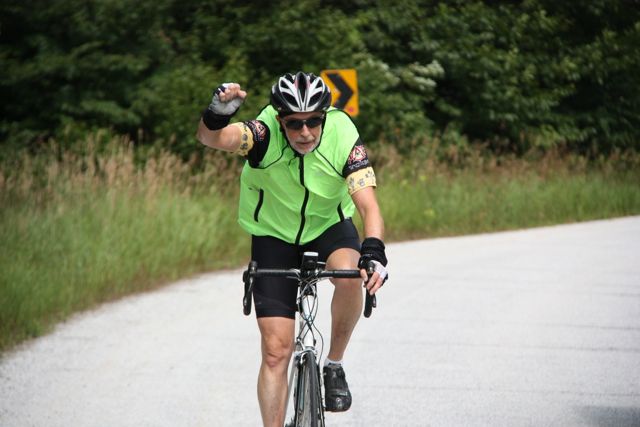
Michael Bell commuted by bike for most of his career. During that time, his longest ride tended to be about 25 miles round trip. Then he took early retirement and became a caregiver for his wife who was progressively succumbing to Alzheimer’s. Riding became his ‘time for himself’. Soon, he was riding 5,000 to 8,000 miles a year. Weekend ‘centuries’ became routine. Eventually, he decided to do a ‘quick’ ride across the USA as a major challenge, and a reason to do fundraising for Alzheimer’s research and care.
That ‘Northern’ crossing was 3,600 miles in 31 days (115 miles per day). He came to the end and thought: “Thank goodness it’s over! When do we start again?”. In 2020 he decided that he would like to do a Southern crossing, a little shorter (2,900 miles, 27 days). He is the sort of person who feels that having fun is not enough; he’d like to pay back in some way. So that is why he felt compelled to seek a cause to promote.
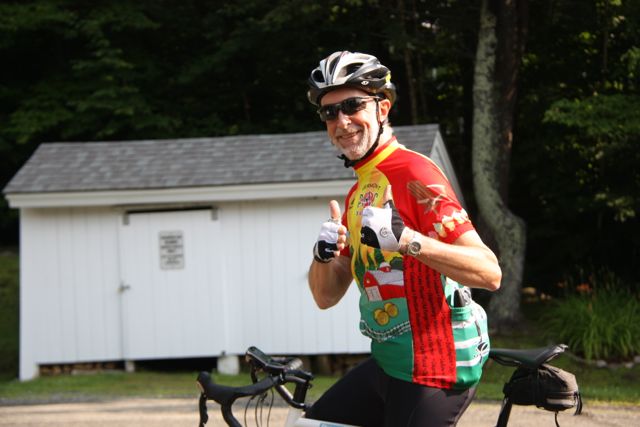
Michael used to work as an economic advisor with the International Monetary Fund. Although they always took notice of the big picture, inevitably their work was focused on the immediate needs of the countries and people they were dealing with. When he retired, he felt that he wanted to “lift my eyes to the horizon.” Climate change seemed the obvious answer. And as a result of living and working in many countries in four/five continents (Europe, Africa, Asia, North America, the Caribbean), he had been struck by hearing everywhere, for decades, the lament “the weather is just not what it used to be,” very often followed by “…and we are suffering.” While living in Nigeria, he could see a prominent example of this in the desertification as the Sahara crept South, affecting Northern Nigeria, and in fact countries all across Africa. Science has now proven that to be true. That is why he chose to focus on climate change.
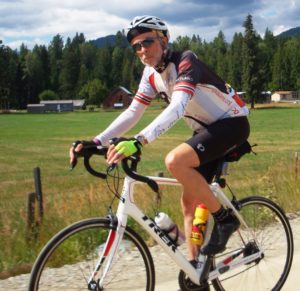
But life is full of challenges. He planned that second ride for September 2020. The pandemic struck. The group ride was postponed by a year. Then in January 2021, his wife died, succumbing to the younger-onset Alzheimer’s that had afflicted her for 15 years, from her early 50’s. At first, it seemed disrespectful to ‘just do a bike ride’. Then it began to seem disrespectful not to.
Now, he has decided to plow ahead, but with an extra focus. He is fundraising for Cure Alzheimer’s as well as Climate Ride. He’s created a website to help him do both, which you can see
here. There is no cure yet for Alzheimer’s and other dementias, but Michael knows better than most that “we need one, for our children and future generations.”
Michael’s beneficiaries are Chesapeake Climate Action Network and the Solar Village Project. Why is he supporting these two climate-related organizations? The response to climate change has to happen on many, many fronts. National and global policies will help. But individual citizens are more likely to understand local problems and be able to influence policies in their region. The Chesapeake Climate Action Network is an outstanding example of a regional organization that targets policies in the Chesapeake Bay area. It just so happens that that area includes Washington DC, so it has the added leverage of being close to national lawmakers.
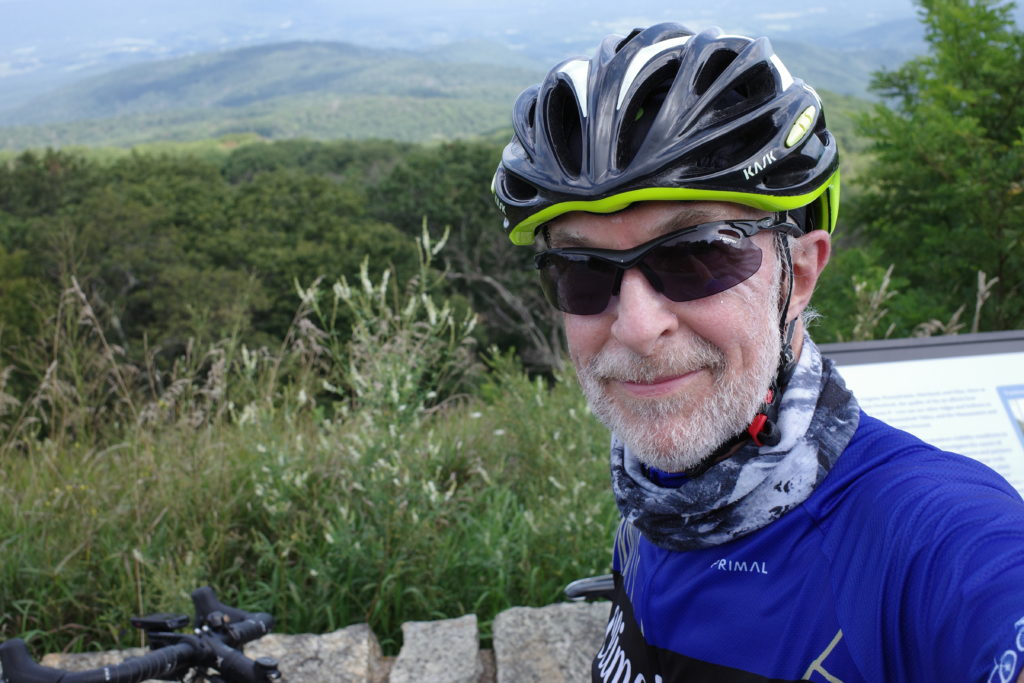
Climate change is largely created by the most privileged countries in the world (including the US). Its most immediate victims are often the least privileged people in poorer countries. The Solar Village Project provides solar power solutions to youth, families, and individuals living in impoverished rural villages in Asia, limiting the negative impacts of an unreliable grid and natural disasters. It is the sort of innovative organization that can help the least privileged, and the least to blame for climate change.
Unlike many intrepid cross-country cyclists, this will be a well-supported ride. He is riding with a tour of about 20 cyclists, organized by Pacific Atlantic Cycling Tours (PACTOUR). They will stay in motels with support vehicles to provide nutrition, hydration, and encouragement along the way! The major challenge will just be the riding. Riding over 100 miles a day on average, on a schedule, regardless of weather, with no rest days. It requires fitness. To get there, he was encouraged to ride at least 300 miles per week for at least a couple of months – that’s about double what he would do in an average week, already a lot. Keeping to that has been quite a challenge, but rewarding.
Michael believes that at the end of the day, efforts like his, and the daily efforts we make to be responsible environmental citizens, recycling, energy-efficient lighting, transport, etc. are essential and should be encouraged. But it’s not enough. He also believes we need huge changes in national and global policy and mindset. When he is off the bike, he focuses more attention on the organizations with that perspective.
In the meantime, you can support his efforts on a bike
here! You can also follow his trip
here.
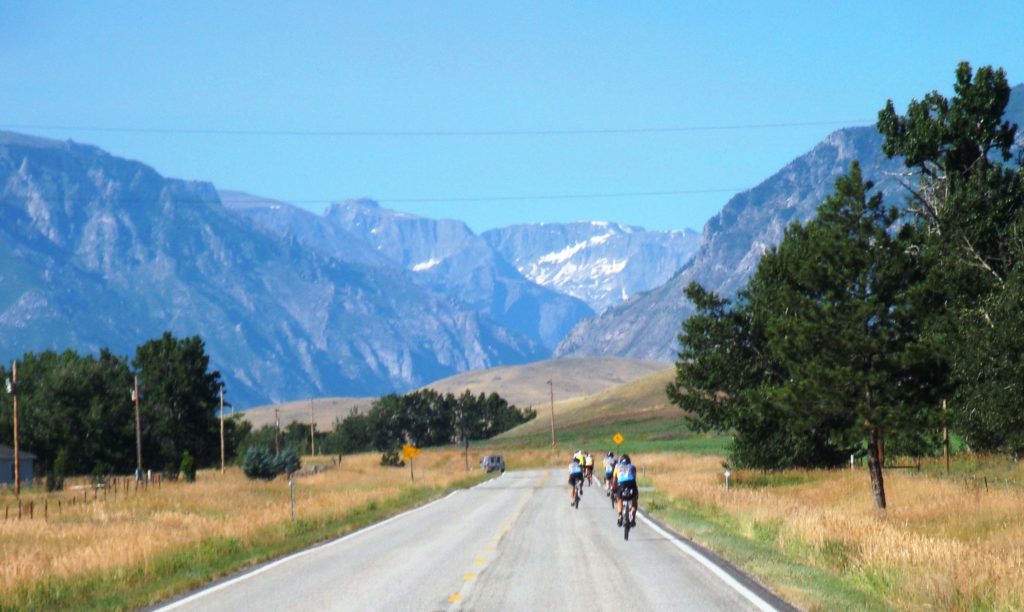
 Michael Bell commuted by bike for most of his career. During that time, his longest ride tended to be about 25 miles round trip. Then he took early retirement and became a caregiver for his wife who was progressively succumbing to Alzheimer’s. Riding became his ‘time for himself’. Soon, he was riding 5,000 to 8,000 miles a year. Weekend ‘centuries’ became routine. Eventually, he decided to do a ‘quick’ ride across the USA as a major challenge, and a reason to do fundraising for Alzheimer’s research and care.
That ‘Northern’ crossing was 3,600 miles in 31 days (115 miles per day). He came to the end and thought: “Thank goodness it’s over! When do we start again?”. In 2020 he decided that he would like to do a Southern crossing, a little shorter (2,900 miles, 27 days). He is the sort of person who feels that having fun is not enough; he’d like to pay back in some way. So that is why he felt compelled to seek a cause to promote.
Michael Bell commuted by bike for most of his career. During that time, his longest ride tended to be about 25 miles round trip. Then he took early retirement and became a caregiver for his wife who was progressively succumbing to Alzheimer’s. Riding became his ‘time for himself’. Soon, he was riding 5,000 to 8,000 miles a year. Weekend ‘centuries’ became routine. Eventually, he decided to do a ‘quick’ ride across the USA as a major challenge, and a reason to do fundraising for Alzheimer’s research and care.
That ‘Northern’ crossing was 3,600 miles in 31 days (115 miles per day). He came to the end and thought: “Thank goodness it’s over! When do we start again?”. In 2020 he decided that he would like to do a Southern crossing, a little shorter (2,900 miles, 27 days). He is the sort of person who feels that having fun is not enough; he’d like to pay back in some way. So that is why he felt compelled to seek a cause to promote.
 Michael used to work as an economic advisor with the International Monetary Fund. Although they always took notice of the big picture, inevitably their work was focused on the immediate needs of the countries and people they were dealing with. When he retired, he felt that he wanted to “lift my eyes to the horizon.” Climate change seemed the obvious answer. And as a result of living and working in many countries in four/five continents (Europe, Africa, Asia, North America, the Caribbean), he had been struck by hearing everywhere, for decades, the lament “the weather is just not what it used to be,” very often followed by “…and we are suffering.” While living in Nigeria, he could see a prominent example of this in the desertification as the Sahara crept South, affecting Northern Nigeria, and in fact countries all across Africa. Science has now proven that to be true. That is why he chose to focus on climate change.
Michael used to work as an economic advisor with the International Monetary Fund. Although they always took notice of the big picture, inevitably their work was focused on the immediate needs of the countries and people they were dealing with. When he retired, he felt that he wanted to “lift my eyes to the horizon.” Climate change seemed the obvious answer. And as a result of living and working in many countries in four/five continents (Europe, Africa, Asia, North America, the Caribbean), he had been struck by hearing everywhere, for decades, the lament “the weather is just not what it used to be,” very often followed by “…and we are suffering.” While living in Nigeria, he could see a prominent example of this in the desertification as the Sahara crept South, affecting Northern Nigeria, and in fact countries all across Africa. Science has now proven that to be true. That is why he chose to focus on climate change.
 But life is full of challenges. He planned that second ride for September 2020. The pandemic struck. The group ride was postponed by a year. Then in January 2021, his wife died, succumbing to the younger-onset Alzheimer’s that had afflicted her for 15 years, from her early 50’s. At first, it seemed disrespectful to ‘just do a bike ride’. Then it began to seem disrespectful not to.
Now, he has decided to plow ahead, but with an extra focus. He is fundraising for Cure Alzheimer’s as well as Climate Ride. He’s created a website to help him do both, which you can see here. There is no cure yet for Alzheimer’s and other dementias, but Michael knows better than most that “we need one, for our children and future generations.”
Michael’s beneficiaries are Chesapeake Climate Action Network and the Solar Village Project. Why is he supporting these two climate-related organizations? The response to climate change has to happen on many, many fronts. National and global policies will help. But individual citizens are more likely to understand local problems and be able to influence policies in their region. The Chesapeake Climate Action Network is an outstanding example of a regional organization that targets policies in the Chesapeake Bay area. It just so happens that that area includes Washington DC, so it has the added leverage of being close to national lawmakers.
But life is full of challenges. He planned that second ride for September 2020. The pandemic struck. The group ride was postponed by a year. Then in January 2021, his wife died, succumbing to the younger-onset Alzheimer’s that had afflicted her for 15 years, from her early 50’s. At first, it seemed disrespectful to ‘just do a bike ride’. Then it began to seem disrespectful not to.
Now, he has decided to plow ahead, but with an extra focus. He is fundraising for Cure Alzheimer’s as well as Climate Ride. He’s created a website to help him do both, which you can see here. There is no cure yet for Alzheimer’s and other dementias, but Michael knows better than most that “we need one, for our children and future generations.”
Michael’s beneficiaries are Chesapeake Climate Action Network and the Solar Village Project. Why is he supporting these two climate-related organizations? The response to climate change has to happen on many, many fronts. National and global policies will help. But individual citizens are more likely to understand local problems and be able to influence policies in their region. The Chesapeake Climate Action Network is an outstanding example of a regional organization that targets policies in the Chesapeake Bay area. It just so happens that that area includes Washington DC, so it has the added leverage of being close to national lawmakers.
 Climate change is largely created by the most privileged countries in the world (including the US). Its most immediate victims are often the least privileged people in poorer countries. The Solar Village Project provides solar power solutions to youth, families, and individuals living in impoverished rural villages in Asia, limiting the negative impacts of an unreliable grid and natural disasters. It is the sort of innovative organization that can help the least privileged, and the least to blame for climate change.
Unlike many intrepid cross-country cyclists, this will be a well-supported ride. He is riding with a tour of about 20 cyclists, organized by Pacific Atlantic Cycling Tours (PACTOUR). They will stay in motels with support vehicles to provide nutrition, hydration, and encouragement along the way! The major challenge will just be the riding. Riding over 100 miles a day on average, on a schedule, regardless of weather, with no rest days. It requires fitness. To get there, he was encouraged to ride at least 300 miles per week for at least a couple of months – that’s about double what he would do in an average week, already a lot. Keeping to that has been quite a challenge, but rewarding.
Michael believes that at the end of the day, efforts like his, and the daily efforts we make to be responsible environmental citizens, recycling, energy-efficient lighting, transport, etc. are essential and should be encouraged. But it’s not enough. He also believes we need huge changes in national and global policy and mindset. When he is off the bike, he focuses more attention on the organizations with that perspective.
In the meantime, you can support his efforts on a bike here! You can also follow his trip here.
Climate change is largely created by the most privileged countries in the world (including the US). Its most immediate victims are often the least privileged people in poorer countries. The Solar Village Project provides solar power solutions to youth, families, and individuals living in impoverished rural villages in Asia, limiting the negative impacts of an unreliable grid and natural disasters. It is the sort of innovative organization that can help the least privileged, and the least to blame for climate change.
Unlike many intrepid cross-country cyclists, this will be a well-supported ride. He is riding with a tour of about 20 cyclists, organized by Pacific Atlantic Cycling Tours (PACTOUR). They will stay in motels with support vehicles to provide nutrition, hydration, and encouragement along the way! The major challenge will just be the riding. Riding over 100 miles a day on average, on a schedule, regardless of weather, with no rest days. It requires fitness. To get there, he was encouraged to ride at least 300 miles per week for at least a couple of months – that’s about double what he would do in an average week, already a lot. Keeping to that has been quite a challenge, but rewarding.
Michael believes that at the end of the day, efforts like his, and the daily efforts we make to be responsible environmental citizens, recycling, energy-efficient lighting, transport, etc. are essential and should be encouraged. But it’s not enough. He also believes we need huge changes in national and global policy and mindset. When he is off the bike, he focuses more attention on the organizations with that perspective.
In the meantime, you can support his efforts on a bike here! You can also follow his trip here.
